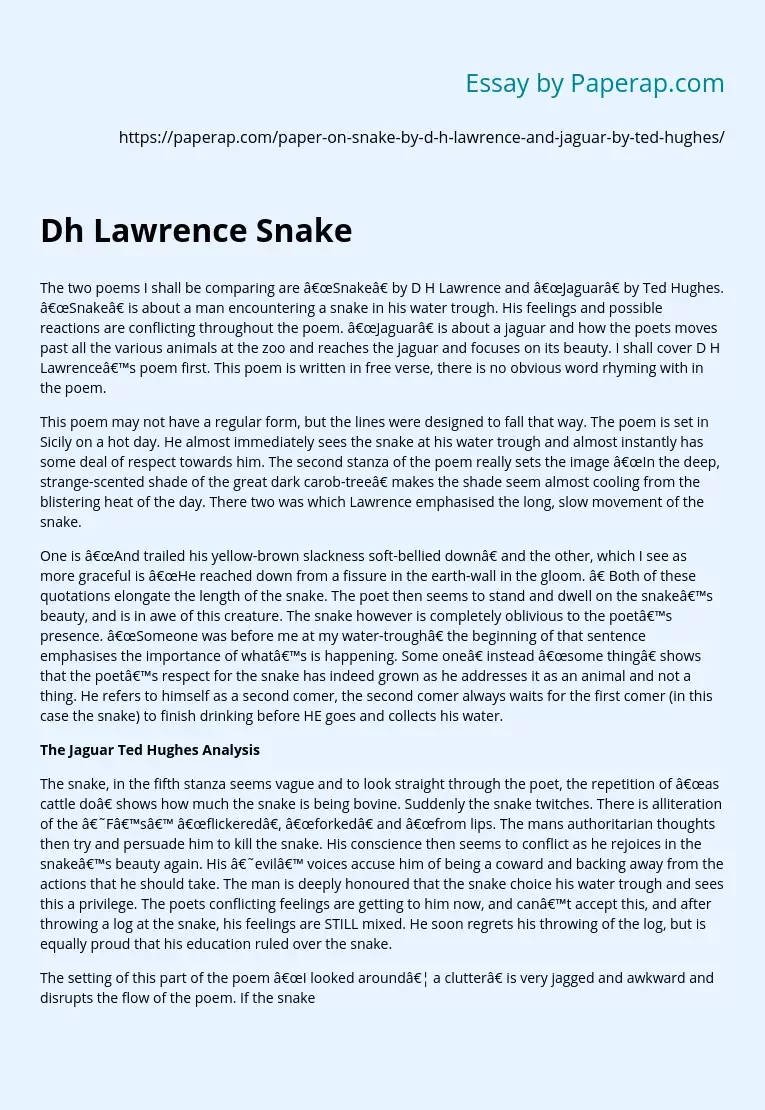Dh Lawrence Snake
The two poems I shall be comparing are “Snake” by D H Lawrence and “Jaguar” by Ted Hughes. “Snake” is about a man encountering a snake in his water trough. His feelings and possible reactions are conflicting throughout the poem. “Jaguar” is about a jaguar and how the poets moves past all the various animals at the zoo and reaches the jaguar and focuses on its beauty. I shall cover D H Lawrence’s poem first. This poem is written in free verse, there is no obvious word rhyming with in the poem.
This poem may not have a regular form, but the lines were designed to fall that way. The poem is set in Sicily on a hot day. He almost immediately sees the snake at his water trough and almost instantly has some deal of respect towards him. The second stanza of the poem really sets the image “In the deep, strange-scented shade of the great dark carob-tree” makes the shade seem almost cooling from the blistering heat of the day.
There two was which Lawrence emphasised the long, slow movement of the snake.
One is “And trailed his yellow-brown slackness soft-bellied down” and the other, which I see as more graceful is “He reached down from a fissure in the earth-wall in the gloom. ” Both of these quotations elongate the length of the snake. The poet then seems to stand and dwell on the snake’s beauty, and is in awe of this creature. The snake however is completely oblivious to the poet’s presence.
“Someone was before me at my water-trough” the beginning of that sentence emphasises the importance of what’s is happening. Some one” instead “some thing” shows that the poet’s respect for the snake has indeed grown as he addresses it as an animal and not a thing. He refers to himself as a second comer, the second comer always waits for the first comer (in this case the snake) to finish drinking before HE goes and collects his water.
The Jaguar Ted Hughes Analysis
The snake, in the fifth stanza seems vague and to look straight through the poet, the repetition of “as cattle do” shows how much the snake is being bovine. Suddenly the snake twitches. There is alliteration of the ‘F’s’ “flickered”, “forked” and “from lips. The mans authoritarian thoughts then try and persuade him to kill the snake. His conscience then seems to conflict as he rejoices in the snake’s beauty again. His ‘evil’ voices accuse him of being a coward and backing away from the actions that he should take. The man is deeply honoured that the snake choice his water trough and sees this a privilege. The poets conflicting feelings are getting to him now, and can’t accept this, and after throwing a log at the snake, his feelings are STILL mixed. He soon regrets his throwing of the log, but is equally proud that his education ruled over the snake.
The setting of this part of the poem “I looked around… a clutter” is very jagged and awkward and disrupts the flow of the poem. If the snake did however return to the trough ten the man would feel deeply forgiven, and there’s suggestion of a relationship between him and the snake as he refers to it as “my snake”. The poem of “The Jaguar” starts in the setting of a zoo, and like “Snake” the second stanza is very descriptive in getting the smell (in this case the stanch of the animals and in “snake” the carob tree).
The animals within the cage are full of inertia, and act like the caged animals that they are. They are all tired and “The apes yawn and adore their fleas in the sun” gives the impression that, like the snake in the first poem, they are bovine. The parrots “like cheap tarts” are very different from the apes and the tiger and lion. Their flashy colours and their loud squawk seem to compliment their loud and outlandish feathers. The birds’ attitudes and that of a tart, loud, attention seeking and wanting something that some one else has in this case the “stroller with the nut”.
The line concerning the lazy lions and tigers are split in two, and starts a new stanza. This is to drag out and emphasise the stillness of the lions. “As still as the sun” here, a simile is used. In D H Lawrence’s poem, he too drags out , and cuts line to get the point across about the snake and its movement. The missing out of “like A fossil” makes this part a metaphor and gives the image of the boa constrictor being exceptionally still, as a fossil is made of stone. “Stinks of sleepers from the breathing straw” sets off the intensity of the stench of the dosing creatures.
The image of the animals being so calm that they could be painted onto a nursery wall was calming and D H Lawrence put across the snake as calming: “guest in quiet” and also “peaceful, pacified”. There is a gust of sudden movement in the poem as the view is then moved onto the jaguar. Sudden movement again is a similarity between the two, when the man looks round for the log and then throws it at the snake at the trough. “The crowd, stands, stares, mesmerised” this crowd are in awe of a creature as the man was to the snake. The onlookers are like ” a child at a dream”, they are amazed at what they see.
Dh Lawrence Snake. (2019, Dec 05). Retrieved from https://paperap.com/paper-on-snake-by-d-h-lawrence-and-jaguar-by-ted-hughes/

